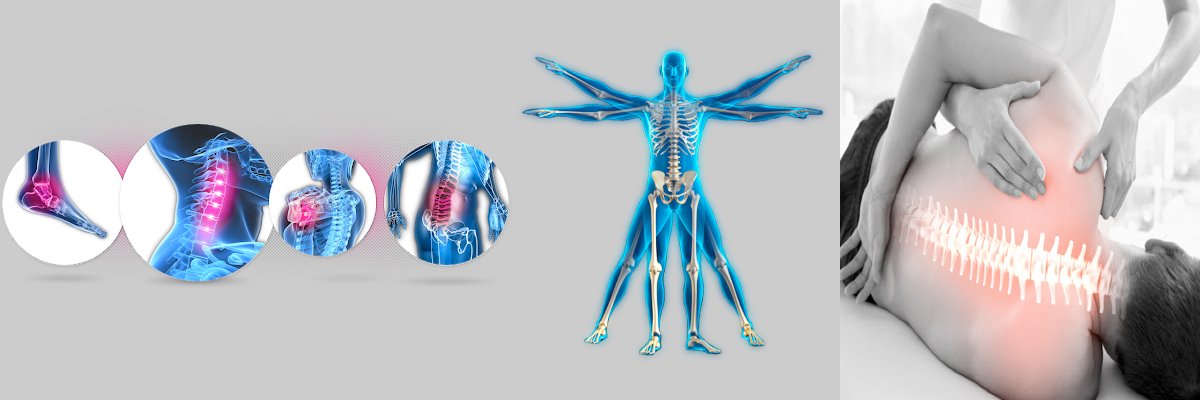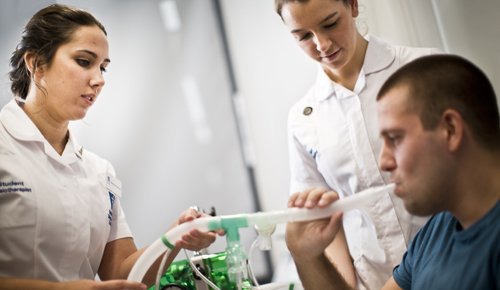
Physiotherapy
Physiotherapy is a specialist branch of medicine that helps remediate impairments in movement, and promote patients’ quality of life through physical intervention to improve mobility and function. Physiotherapy is a science that seeks to improve movement dysfunction, promote optimal health and functions of the human body. It is a healthcare profession which provides services to individuals and populations to develop, maintain and restore maximum movement and functional ability throughout life. This includes providing services in circumstances where movement and function are threatened by aging, injury, disease or environmental factors.
Physiotherapy is a primary health care profession aimed at enhancing mobility, physical independence & quality of life. It is focused on; treating a variety of conditions and promoting health & well-being. It is also prescribed to individuals who vary in; age and athletic ability. Physiotherapists are skilled in the hands-on management of medical problems.
What does a Physiotherapist do?
- They are the first-line health professionals who are skilled in health promotion, injury prevention and patient management.
- They diagnose and make decisions on the presenting problem
- They treat the individuals by using education, exercise, electrotherapy, and manual therapy techniques and maneuvers.
- They rehabilitate the individuals to achieve the best functional level
How do Physiotherapists Approach Patient Care?
They are Patient-friendly and:
- Pursue the individual goals and aspirations of their patients
- Tackle the root cause of physical health problems
Release clients in good health as quickly as possible
What specific conditions do Physiotherapists treat?
Orthopaedic
- Back and neck pain
- Arthritis and osteoarthritis
- Fractures or Sprains
- Joint replacements
- Sports injuries
- Muscle, tendon and Ligament Injuries
Benefits
- Decreased pain
- Improved joint mobility and strength
- Restored physical function and injury prevention
Possibly prevent or delay surgery

Cardio-Respiratory
- Chronic obstructive pulmonary disease
- Cystic fibrosis
- Heart disease
- Respiratory infections
- Post-surgical care
Benefits
- Improved breathing and secretion clearance
- Reduced breathlessness and increased endurance
- Increased strength of arms and legs

Neurological
- Developmental delay
- Parkinson’s disease
- Spinal cord injury
- Stroke
Benefits
- Improved balance, coordination, strength, flexibility, and function
- Ability to manage daily tasks
- Reduced pain
- Improved mood

Women’s Health
- Pre & Post Delivery health
- Chronic pelvic pain
- Incontinence
Benefits
- Reduced post-surgical pain and swelling
- Improved pelvic pain and urinary incontinence
- Improved post delivery health status

Courses
Bachelor of Physiotherapy (BPT): 4 ½ years (Including Six Months of Internship)
Major Subjects to be studied in BPT (May vary the order from University to University)
First year: Anatomy, Physiology, Biochemistry, Biomechanics, Psychology, Sociology
Second year: Pathology, Microbiology, Pharmacology, Exercise therapy, Electrotherapy, Research
Third year: Orthopedics & Sports Physiotherapy, Medicine, Cardio Respiratory Physiotherapy
Fourth year: Neurology & Neurosurgery Physiotherapy, Community Medicine & Community Based Rehabilitation, Paediatric Physiotherapy, Research Project
Master of Physiotherapy (MPT): 2 Years
Specialties:
- Master of Physiotherapy in Musculoskeletal Disorders and Sports
- Master of Physiotherapy in Neurological and Psychosomatic Disorders
- Master of Physiotherapy in Cardiorespiratory Disorders and Intensive Care
- Master of Physiotherapy in Pediatric Physiotherapy
- Master of Physiotherapy in Obstetrics and Gynaecology/ Women Health
- Master of Physiotherapy in Community Physiotherapy
- Master of Physiotherapy in Hand Rehabilitation
- Master of Physiotherapy in Geriatrics
PhD Physiotherapy
Eligibility Criteria
Bachelor of Physiotherapy (BPT)
10+2 /PUC with Physics,Chemistry and Biology (PCB) Combination
Minimum Marks required is 50% in PCB (May vary from University to University and Institution to Institution)
Master of Physiotherapy (MPT)
Minimum 50% marks in BPT (May vary from University to University and Institution to Institution)
PhD Physiotherapy
After completion of MPT with minimum 50% marks in MPT (May vary from University to University and Institution to Institution)
Entrance Examination
There is no Bachelor of Physiotherapy (BPT) specific All India Entrance Exam.
Job Profiles
There are a lot of career opportunities for the physiotherapists to work across the country and even abroad. The usual positions they obtain are:
Academia
Government
Research
Clinical Positions:
- Community Organisations
- Fitness Centers/ Gymnasiums
- Hospitals
- Industrial workplaces or other occupational environments
- Multinational companies for fitness of their employers
- Paediatric / Geriatric Homes/Special schools
- Private Clinics
- Private Practices
- Rehabilitation Centres
- Sporting Clubs & Teams
Top Recruiters
- Apollo Hospitals.
- Aster MIMS group of Hospitals
- Defence Ministry of India.
- Fortis Healthcare Company.
Institutions
| major Institutions (national level) |
|---|
| Institutions in Kerala offering Bachelor of Physiotherapy (BPT) |
|---|
| Name of the Institution | District |
|---|---|
| LIMSAR, Angamaly | Ernakulam |
| Medical Trust College of Medical Sciences,Kochi-16 | Ernakulam |
| University College of Medical Education, Angamaly | Ernakulam |
| University College Of Medical Education,Thevara | Ernakulam |
| Co-op Hospital Federation, Thalassery | Kannur |
| Institute of Paramedical Sciences, Kannur Medical College | Kannur |
| Lourde Iinstitute of Allied Health Sciences | Kannur |
| BCF College of Physiotherapy, Vaikom | Kottayam |
| School of Medical Education, Gandhinagar, MG University | Kottayam |
| AWH Special College, Kallai | Kozhikode |
| JDT College of Physiotherapy | Kozhikode |
| KMCT College of Allied Health Sciences | Kozhikode |
| Sree Anjaneya College of Paramedical Sciences | Kozhikode |
| EMS College of Paramedical Sciences, Perinthalmanna | Malappuram |
| Bethany Navajeevan College of Physiotherapy, Nalanchira | Trivandrum |
| Institutions in Kerala offering Master of Physiotherapy (MPT) |
|---|
| Name of the Institution | District |
|---|---|
| Co-op Hospital Federation, Thalassery | Kannur |
| School of Medical Education, Gandhinagar, MG University | Kottayam |
| AWH Special College, Kallai | Kozhikode |
| Bethany Navajeevan College of Physiotherapy, Nalanchira | Trivandrum |
| Institutions offering B. E. Polymer Engineering |
|---|
| Institutions in Karnataka |
|---|
| Medical College Attached Institutions |
|---|
| Other Colleges |
|---|
| Name of the Institution |
|---|
| Alva’s College of Physiotherapy, Moodbidri, Mangalore |
| Dayanand Sagar College of Physiotherapy, Bengaluru |
| Dr. M.V.Shetty College of Physiotherapy, Mangalore |
| Hosmat College of Physiotherapy, Bangalore |
| Krupanidhi College of Physiotherapy, Bengaluru |
| Padmashree Institute of Physiotherapy, Bengaluru |
| Shreedevi College of Physiotherapy, Mangalore |
| The Oxford College of Physiotherapy, Bengaluru |
| Vikas College of Physiotherapy, Mangalore |
| Institutions in Tamil Nadu |
|---|
Questions & Answers
Q) Do Physiotherapists use equipment to treat patients?
A) Physiotherapists are trained to treat their patients mostly by using physiotherapy techniques/ maneuvers but in some cases physiotherapists use equipments of electrotherapeutic modalities like; Laser, Ultrasound, Infra Red, Shockwave Therapy, Body Weight Assisted Treadmill Training, Functional Electrical Stimulation, Electromyography etc.
Q) Do Physiotherapists use Medicines to treat patients?
A) Physiotherapists usually don’t use medications for the treatment of their patients. However, sometimes they use some externally applicable medicated ointments along with the electro therapeutic modalities for the betterment of the patient condition.
Physician adds years to the life…… Physios adds life to the years!!!
